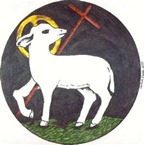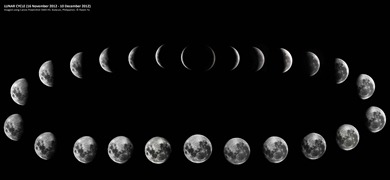[T]he word “spirituality” [is] not a noun, it’s not a something. It’s not even a nothing. Or a preposition, a relational plank bridging a this and a that. It’s more like a verb, an action, a doing. It’s something done. Yet what’s done is the act of asking a question. [...] “[S]pirituality” is an interrogative. It’s a placeholder for a series of productive but unanswerable questions, just as the term “art” is. Where is art? Not where you think... In a similar way, “spirituality” initiates an inquiry: What is the religious? When is the religious? Where is the religious? – Thomas Tweed, ‘John Cage’, freq.uenci.es, 22nd November 2011
Look up into the heavens. Who created all the stars? He brings them out like an army, one after another, calling each by its name. Because of his great power and incomparable strength, not a single one is missing. – Isa 40:26
If you are a regular reader of my blog the name Stephen Nelson might ring a bell. We had a conversation back in 2011 about concrete and visual poetry, two subjects I knew very little about at the time and still know little about; I’ve dropped the ‘very’ so it wasn’t a complete waste of his time. Stephen’s just published a collection of poems and he asked if I’d like a review copy. I accepted against my better judgement because I felt ill-equipped to judge the merits of a book of concrete and/or visual poems but I was willing to give it my best shot. A couple of weeks later the book arrived from his publisher, Knives Forks and Spoons Press, and I found myself facing a block of stream-of-consciousness writing some forty pages long that filled half the book. The rest was made up primarily of concrete poems and prose poems, another form I’m not well-versed in. What the hell had I let myself in for? At the time there was only one review online on the One Night Stanzas site in which Claire Askew writes:
It’s only January, but I’ll be shocked if I find a more original, enjoyable collection to top it this year. I’m calling my Top Poetry Read of 2013, folks!
“Okay,” says I, “if she thinks it’s so damn good let’s put our reservations to the side and see what’s what.” The collection’s broken into two parts, ‘The Moon from my Windowless Heart’ and ‘Crescent’ and I’m going to spend most of my time on just one poem.
The Moon from my Windowless Heart
The first part consists of only two poems, ‘Song’ which you can read on Claire’s site here and ‘Look Up!’, a three and a half thousand word tirade. Both are written in Scots which I’ve no problems with personally being Scottish although if you’ve met me you’ll have noticed I don’t even have a slight Scottish accent. Non-Scots will struggle which is a shame because there’s plenty to struggle with here without writing in a (what will be for most people) foreign dialect. But I support his decision. Would Hugh MacDiarmid’s poem ‘A Drunk Man Looks at the Thistle’ be half as effective as it is if it had been presented in Standard English? I doubt it. Scots talk with an accent—my daughter does and my siblings (I’m just weird). As Stephen’s poem is set in Scotland and has a Scottish narrator, it’s appropriate if for that reason only, but Scots is also one of the voices of the downtrodden masses, the plebs, the common people. His narrator’s concerns are universal; a bloke from the east end of London or the Bronx could easily relate to what’s being saying here.
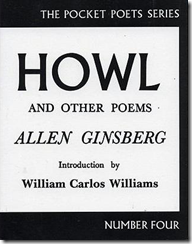 In the late seventies I used to correspond with a poet from Bristol if memory serves right. He was a HUGE Ginsberg fan and very kindly sent me a copy of Howl and Other Poems which I hated and barely got by the second page. We disagreed on just about everything to do with poetry and the letters dried up after a few weeks. I mention this because my first thought about the second poem in Stephen’s collection was that it’s a Scottish ‘Howl’; they’re actually just about the same length if you include the footnote to ‘Howl’. Claire also noted the obvious similarities with poetry by the Beats and so I asked Stephen who told me:
In the late seventies I used to correspond with a poet from Bristol if memory serves right. He was a HUGE Ginsberg fan and very kindly sent me a copy of Howl and Other Poems which I hated and barely got by the second page. We disagreed on just about everything to do with poetry and the letters dried up after a few weeks. I mention this because my first thought about the second poem in Stephen’s collection was that it’s a Scottish ‘Howl’; they’re actually just about the same length if you include the footnote to ‘Howl’. Claire also noted the obvious similarities with poetry by the Beats and so I asked Stephen who told me:
Ginsberg and ‘Howl’ were influences, but also d.a. levy's long poems. I was reading both poets as inspiration and the Beat feel is intentional. I love both these poets.
This meant I’d need to get over myself and look at ‘Howl’ again. Much to my surprise I found out it’s not an especially complex poem once you boil it down.
In the first line of the first section, the speaker tells us that he has been a witness to the destruction of "the best minds" of his generation. The rest of the section is a detailed description of these people – specifically, who they were and what they did. He doesn't tell us what destroyed them quite yet, though we get plenty of hints. Most lines begin with the word "who" followed by a verb. These are people "who did this, who did that," etc. We quickly learn that these "best minds" were not doctors, lawyers, and scientists. They were not people whom most middle-class folks in the 1950s would have identified with the best America had to offer. And that's exactly Ginsberg's point. According to the speaker, they are drug users, drop outs, world travellers, bums, musicians, political dissidents, and, yes, poets.
If the key word of the first section was "who," the second section asks "What?" As in, what destroyed the best minds of his generation? Ginsberg provides the answer immediately: Moloch. In the Hebrew Bible, Moloch was an idolatrous god to whom children were sacrificed by placing them in fire. In other words, not a friendly god. […] For Ginsberg, Moloch is associated with war, government, capitalism, and mainstream culture, all of which might be summed up by one of the poem's most important concepts: the "machine" or "machinery." Moloch is an inhuman monster that kills youth and love.
The third section is addressed to Carl Solomon, Ginsberg's close friend from the Columbia Presbyterian Psychiatric Institute. The speaker refers to this psychiatric hospital by the shorter and more evocative fictional name of "Rockland." He reaffirms his solidarity with Solomon over and over again by repeating the phrase "I'm with you in Rockland." The central question of this section is "Where?" The speaker uses this question to explore Solomon's existence within the walls of the institute. The poem ends with the image from the speaker's dreams, in which Solomon is walking from New York to the speaker's "cottage" (in Berkeley, California), where they will reunite. – shmoop.com
What complicates matters is the fact that Ginsberg hadn’t written his poem with a mass audience in mind and a great many of the things he references will go over a casual reader’s head and even more so now almost sixty years have passed and it’s no longer contemporary. It’s a poem that needs to be studied before it can be fully appreciated. Ferlinghetti initially rejected the poem when it was offered to him but changed his mind after its first reading. Surely if it was such an important piece 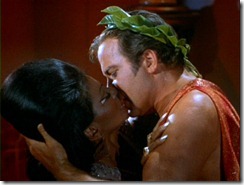 he would’ve seen it there and then. All firsts are significant because they’re firsts but that doesn’t mean they’re necessarily great art. The Star Trek episode ‘Plato’s Stepchildren’ which contains the (arguably) first interracial kiss on TV is nothing to write home about but it won’t be forgotten because of that kiss and I think of ‘Howl’ in much the same respect. Yes, it challenged freedom of speech and good on it for that but, that aside, it’s an esoteric work aimed at a tiny audience. Had it not gained notoriety because of the trial I wonder if it would be as well-regarded as it’s become? Who knows?
he would’ve seen it there and then. All firsts are significant because they’re firsts but that doesn’t mean they’re necessarily great art. The Star Trek episode ‘Plato’s Stepchildren’ which contains the (arguably) first interracial kiss on TV is nothing to write home about but it won’t be forgotten because of that kiss and I think of ‘Howl’ in much the same respect. Yes, it challenged freedom of speech and good on it for that but, that aside, it’s an esoteric work aimed at a tiny audience. Had it not gained notoriety because of the trial I wonder if it would be as well-regarded as it’s become? Who knows?
Stephen’s poem ‘Look Up!’ won’t cause a ruckus. Little shocks people these days. In 1955 homosexuality was something people hid—just think of the film stars who went to great lengths to keep their true nature secret—but now gays are a part of the mainstream. Not that that’s the focus of Stephen’s poem; his poem is about drugs but then again who bats their eye these days when they hear about kids taking drugs? It’s almost regarded as a rite of passage and, again, in that regard I’m also a bit weird because (prescription drugs aside and my experiences with them were quite enough, thank you very much) I’ve never used any recreational drug bar alcohol and I pretty much gave up drinking that in my twenties.
Anyway I sat down and read his poem. Then I read it again. After a third read I e-mailed Stephen and asked for a softcopy which he sent me and I spent two full days annotating the poem. That done I decided to try a write a summary of it which I did and passed to Stephen to see how well I’d done. I’ll let you know his response later but for the moment I’m going to stick with my reading since it’s as valid as anyone else’s. That’s the problem when you write a poem that’s open to interpretation; you really can’t whinge when someone comes along and imposes their own structure on the piece. I’ve a tendency to read things literally. I wanted to know who was talking, where they were talking, what they were doing when talking and over what timeframe events took place. This is what I came up with:
The poem features a first-person narrator, a male, an adult, Scottish and, judging from the accent (the poem’s written in dialect) living in the central belt near Glasgow. Over the course of the poem we learn little about the man: his parents are still alive and he becomes (or has already become) a disappointment to them due to his lifestyle choices; he has children but it doesn't sound as if he’s a wife. He has at least one friend who’s a girl and who he sleeps with but I don't think she's his girlfriend in the traditional sense. He's not homeless, can drive, has access to a car and certainly has enough money to be able to afford to buy breakfast at a drive-thru. He never mentions a job but since he's more than empathetic with the socially deprived about him—perhaps, although he's not living rough, he's still technically homeless—it's likely he's currently unemployed. He has problems with drink and drugs and it’s probably fair to say that at the start of the poem he’s spiritually empty.
I was brought up in a religious household and studied the Bible for many years. Okay, the Bible’s not a poem despite the fact it does contain some poetry and a lot of people struggle with how to read it. Some take it literally—if it says God created the heaven and the earth in six days then it must be six literal days—but science has pretty much disproved that so when the Bible talk about days it must mean a longer time period. Think of the expression, “in my day”—what day was that that? I’ve lived for almost 20,000 days—which particular one was my day? Some things in the Bible are literal—King David was a flesh and blood man—and some things are not, e.g. the cast of Jesus’s parables. How do you decide? Common sense really. And the same goes for poetry. When Stephen’s narrator says:
Ah made masel a fry up –
bacon, eggs, mushrooms –
ah ate dinner, tranced-out autonaut,
ah smoked & watched Eastenders,
I take that literally. When he talks about leaving his body and floating above the earth, well I’m going to go with symbolic, metaphorical or hallucinatory. The picture of the man above was collated from the handful of facts that are peppered throughout the poem. They may not be important to some people but they made a real difference to me.
Part I
The poem opens with the man looking out at a tall government building. Stephen lives in Hamilton so I imagined this to be the South Lanarkshire Council Headquarters on Almada Street—it fits the description—but it isn’t important.
He's in spiritual crisis although it's secular things that have his attention at the moment, a government that can't be trusted and the consequences of their (and presumably previous governments') poor decisions:
Av been perched at this windae fur
a while noo starin oot at yon monolith
ae local government wi us aw teeterin
oan the edge ae the abyss aboot
tae plunge heid first thru chaos and calamity,
the next bunch ae jerk-offs
showerin us wi silver tongued deceits,[ae = of]
Ginsberg claimed Part II of ‘Howl’ was inspired by a peyote-induced vision of the Sir Francis Drake Hotel in San Francisco which appeared to him as a monstrous face. Stephen’s narrator doesn’t see a face (at least not here) but he does see the moon which is a significant and recurring image throughout this book:
(Ah saw the full moon once
reflected in its dark glass,
like a picture taken in outer space
beamed back and shimmerin
on a screen grainy vision ae beyond)What’s he doing looking at this building? He’s…
contemplatin the nature ae spiritual
LUMINOSITY against a background
ae social deprivation drug induced mayhem
& blood bleached alcoholism –
FUCK!
Here & now! I mean here & fuckin now!If you’re not familiar with how Scots talk then you should know that when you’re reading this poem treat the block capitals the same way as would do in an e-mail or a comment; these words need to be emphasised; seriously just imagine Billy Connolly reading this and you’ll not go far wrong. The expression “blood bleached” puzzled me initially until I confirmed what I suspected that alcohol starves red blood cells of oxygen[1]. I also found the use of the world ‘LUMINOSITY’ an unusual choice—we tend to think of spiritual enlightenment—but since astronomers use the term luminosity to measures the total amount of energy emitted by a star or other astronomical object it’s obviously a more poetic choice given that so much emphasis is placed on stellar phenomena in the poem. The full moon on a clear night measure between 0.27 and 1 lux.
He's fascinated by the counterculture movement of the 1960s:
Granted av always hid these swirlin sun eyes gazin
back oan the 60s a dream machine vision
ae evolutionary leap up, leap up![hid = had]
and clearly views those who followed Dr Timothy Leary in a sympathetic light—he’s been reading up on the subject—although it looks like he has more in common with the followers than the leaders; in the second half of the poem he draws parallels with the rave culture of the 1980s.
He's evidently assimilated a great deal of information about eastern mysticism because he uses many expressions above and beyond those that have slipped into popular culture. For example, I thought Stephen was simply being poetic when he used the term ‘dream machine’ but was surprised to discover that such a thing actually existed and was in fact a stroboscopic flicker device. When he talks about the Millbrook happenings he shows he's familiar with the protocol for these gatherings.
girls in green saris loungin on the lawn
like yellow haired dakinis waitin tae greet
every star seekin psychonaut filtered thru
the heavy iron gatesHe also understands why the fifties were a time ripe for social change; following the end of the World War II people were living in fear and looking for answers:
atom bomb mushroom cloud or
magic Acidmind expansion,
take yer pick!Despite his obvious preoccupation with the sixties our narrator’s not blind to the fact that there were casualties of this cultural revolution along the way and “picks”—which I took to be a play on ‘guitar pick’—a number of famous musicians—the likes of Peter Green, Syd Barrett, Skip Spence and Roky Erickson—all of whose careers suffered because of abuse of LSD; all the four above are believed to have suffered from schizophrenia and here we have another commonality with Ginsberg’s poem because although it was dedicated to a schizophrenic, Carl Solomon, Ginsberg later claimed that at the core of ‘Howl’ were his unresolved emotions about his schizophrenic mother. Also when the narrator uses the repeated phrase “Ah'll take ma pick” this reminded me of the same technique used by Ginsberg where he uses a similar phrase of solidarity, “I'm with you in Rockland.”
Despite an awareness of the damage drugs can do apparently Stephen’s narrator isn’t put off. From this point on he talks about his experiences under the influence of alcohol and at least two kinds of hallucinogens, psilocybin and ecstasy. He begins with an experience he's had whilst in bed—and probably not a one-off from the past because he uses the present tense—when under the influence of rum and so-called magic mushrooms. Predictably he draws on his readings to explain what he's experienced and so many of the metaphors and images reference eastern religions plus there are a number of references to stellar bodies—the sun, stars, comets—throughout the whole piece but the moon especially features. Whilst high he hears—or imagines he hears—a woman's voice saying his name:
Well, can ye imagine?
Who the fuck is that? God? God's maw?
It occurs tae me that the voice lulls back
tae an awesome silence deep well of
loneliest love. It's a female voice –
mother
sister
familiar yet unrecognised
compassion.Is he having some kind of spiritual awakening? He describes this a little later as “the night of storms”:
No' always so fur alang wi the voice comes
the night of storms, fierce howlin winds
rammin lamposts, trees, coilin then unleashed
on civil man, tucked up in bed as ah was,
no-pity gales fae the darkest caverns of the earth.[fae = from]
This, of course, reminded me of the experience of Elijah recorded in 1 Kings 19:11-13:
Then a great and powerful wind tore the mountains apart and shattered the rocks before the Lord, but the Lord was not in the wind. After the wind there was an earthquake, but the Lord was not in the earthquake. After the earthquake came a fire, but the Lord was not in the fire. And after the fire came a gentle whisper. When Elijah heard it, he pulled his cloak over his face and went out and stood at the mouth of the cave.
Then a voice said to him, “What are you doing here, Elijah?”
Our narrator now frames two important questions. He wonders…
whither
drugs ir able tae precipitate such deep spiritual
experience ae a sort once conjured
by yer prophets & yer shamans[…]
& whither such experience is relevant or admissible
in an age gon saft oan science (suck oan science!)
material reductionismThe sixties were a time ripe for change. As Stephen notes so often "enlightenment goes hand in hand / wi social reformation"; if there was ever a time change is needed, as he put it right at the start of the poem, it’s:
Here & now! I mean here & fuckin now!
He moves on from such lofty topics to more immediate concerns, i.e. his love life:
Such things that happen!
Such things as fallin in love.
A huge gaitherin ae desire in the belly
fur a beautiful girl sweet henna hair
fallin ower delicate shooders & staunin
next tae her wis a charge a bolt
a sudden dance drawn deeper & deeper
intae her laugh her eyes – ye know the score!It looks like he's fallen for a married woman—he says “she hid [i.e. had] a man”—but hasn't had the nerve to pursue things as aggressively as he might have. He remembers finding himself at another girl's house where they end up in bed:
So that wan night, drunk at a friends,
up aw night in torments ae hell,
ah danced wi her shade
& lay wi her ghost
& screamed a scream
ower streets & rooftops,
smotherin it, suppressin it,
a silent scream,
an inner roar,
Here he experiences what he describes as a kundalini awakening[2]. One of the physical effects can be extreme sexual desire (although it can apparently go the other way too). In practical terms, one of the most commonly reported Kundalini experiences is the feeling of an electric current running along the spine and Stephen describes something very similar. You can read a good description here.
In the morning he orders burgers from a drive-thu. The girl's voice over the intercom reminds him of the voice he’d heard during his trip. When he'd awoken that morning he'd seen a face before him but not the girl he'd been with—we don’t even know whose bed he woke up in—so perhaps the face belonged to the married woman although even if it was she probably symbolises something greater.
He goes about his day as usual—no mention of a job—but all he's really waiting for is the night when he'll be free to take a further trip.
moved through the day
a pale, distracted ghost (bread fae the
bread shop, remember?), waitin
fur the phantom night,Once home, has a fry-up for tea (typical Scottish cuisine), watches Eastenders and thinks about his recent experiences whilst under the influence. Presumably he takes some drugs—he mentions having a smoke but he doesn’t say what of—puts on some music and describes this second trip where the voice has now become a “PRESENCE”:
a lover, a touch ae the maddest love,
ma mind playin oot sich tender
mallow beauty . . .
("Feel so close to you!")
Yet meltin intae somethin,
an invisible love,
a sweeter union![sich = such]
I tracked down two dozen songs with the words ‘feel so close to you’ in them. That’s when I gave up and asked Stephen, not that it’s especially important—the sentiment is the same in them all— what the song was. He told me:
[T]he lyric is the first line, or perhaps a mishearing of the first line of the song ‘I Wanna Know What Love Is’ by Foreigner, that old power ballad.
Because I read the thing literally—and because he specifically talks about “spring loaded bounce pop”—that one wasn’t on my list.
The love he talked about earlier becomes more abstract and he imagines he's left his body. He flies over some of the places that were focal points to the drug culture lifestyle of the past—places like, the Libre artistic community, Taylor Camp and swinging London—and the present—sites like Tipi valley and Glastonbury. Again he starts to think about the rise of drug cults around the world
Part II
Although this part opens with another—albeit much shorter—recollection of what I’m taking to be a third trip (this time including an out-of-body experience and a nod to past life regression) the main emphasis in this part of the poem is on refocusing his life:
Nae cults fur me, awash & awake
tae primal life force myelination,
fierce upsurge ae full charge neuron
BLITZ!Perhaps he's starting to see signs in himself of an "emergin mental illness".
He looks at the rave culture of the nineties.
MDMA,
new drug fur a
new youth –
squeezed oot by greed &
vain materialism!He can see definite parallels between the rise of various New Age cults in the sixties—specifically Acid cults—and the spiritual aspects of rave culture.[3] There are obviously highs…
The pu ae this,
the pulse ae this,
catching the tail ae the
comet & fleein wae it!
Weekend dance orgies
fuelled by sonic banks
stacked high against
autumnal skies;and lows…
Tae end up . . .
hingin fae the ceilin by
yer nerves, swingin fae the
fittins by yer
nerves, wrecked, a wreck,
lyin in yer bed aw week,
gouchin, fleein, then
quickly deflated, flat,
flattened wi fear,
chitterin wi fear
fur the nerves yiv fried & the
organs yiv pulped,
no able tae walk or talk,
except when ye talk–
yer maw mad wi worry,
yer da's pride ripped right
oot 'im . . .[pu = pull, gouchin = hanging out, chitterin = shivering]
This section ends with him burned out after overdoing it. He’s bedridden for a week and when he does get up he’s happy simply to lie in a bath all day long. His parents are beside themselves.
What he then describes I took to be withdrawal symptoms:
Ah lie in bed, takin this, sufferin this,
sick auric fusion, total wrench ae
free will consciousness –
seized upon,
possessed,He compares it to being "perched oan a sick, black mountain" and being possessed by "a scarlet queen". In the midst of all this the quiet voice returns but the message is clearer this time: "I am the Lord's”. His family nurse him back to health and he starts to think more clearly about where drugs fit into modern society—Dr Leary's legacy is clearly still alive and kicking—but more importantly his own life:
The tease ae drink, the lure ae
drugs, a silent pool, a quick escape,
slow temptation . . .He then describes a planned spiritual pilgrimage across Scotland highlighting many of the places of significance to Christians, places like Iona (St Columba) and Dunfermline (Saint Margaret of Scotland):
Ah'll visit Dumfries, Whithorn, Stranraer!
Girvan, Arran, Cumbrae!
Ah'll sleep by the roadside,
Ah'll beg for ma bread,[4]Ah’ll follow the LAMB.
Oan ma road wi
ma voice!
Ma vast calm!
Ma loss in Thee!
Ma hair,
Ma lips,
Ma eyes.
Ma cleansin!It looks like he’s found religion but not a new religion, in fact a very old one which is perhaps why the poem ends with a chant to Jehovah, the god of the Old Testament who, of course, Ginsberg namechecks in ‘Howl’ too. I very much doubt he’s suggesting that he’s answered the door to a couple of Witnesses and been converted:
Ma road,
Ma light,
Ma voice.
A vast calm!
A silversong dream devotion:
JEHOVAH
JAH
JEHOVAH
JAH
JAH
AH
JAH
JEHOVAH!
This is what Stephen had to say when he read my interpretation of his poem:
Perhaps the attempt to pin down the narrator is a little too literal. Many of the details are oblique autobiographical references or simply generalisations about contemporaries who were involved in the drug scene. The references to various trips are general and oblique and shouldn't be taken as literal trips. Also a lot of what the narrator experiences, like the voices and guided thoughts, aren't part of a drug trip but more like spiritual breakdown associated with kundalini. These aren't linear in the poem, but flit in and out like thoughts or images in the mind. It's about the movement of mind as random and chaotic rather than anything directly linear or narrative.
As for the end, yes, it's Christian, but also interfaith, both. There's an openness and non-duality, but from a Christian bedrock. The path of salvation is Christian (for the narrator) but not exclusive in general.
Fair enough. The problem with any work that’s ‘open to interpretation’ is that no one can say your interpretation’s wrong, not even the author. Perhaps he wasn’t clear enough. Perhaps it would help if I understood stuff like kundalini. The poem as a whole has a great deal of energy and I could imagine, as with ‘Howl’, a public reading of it could be most entertaining. My main problem with it—and the same goes for ‘Howl’—is that it contains too many esoteric and cryptic references. To 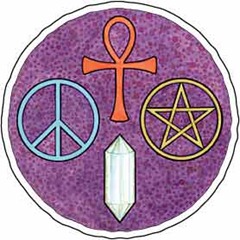 understand both of these works you have to study them. In my opinion Ginsberg’s is weak in that it contains too many autobiographical and now dated elements (Gregory Stephenson for one disagrees with me here); Stephen’s is weak—again, in my opinion (and I’m sure there will be others who’ll disagree with me)—in that it contains too many obscure terms like kundalini, the Age of Aquarius, Helios, dakini, psychonaut, light-being, Tantrika, om, trans-dimensionality, new frequencies, karma, astral projection, bluestone healer, ghat, ashram, guru, shaman, trance dance, levitation, bardo, lifeforce, vision quest, bodhisattva, Krishna…Do you have to understand all of these terms to get the gist? No, and that will be enough for most. They’ll just let the psychobabble for want of a better expression wash over their heads in exactly the same way Star Trek fans buy the technobabble without batting an eye; it’s all window dressing. Did the hippies back in the sixties understand all these terms? Unlikely. The vast majority were in it for the drugs and the sex or am I being just a wee bit too cynical?
understand both of these works you have to study them. In my opinion Ginsberg’s is weak in that it contains too many autobiographical and now dated elements (Gregory Stephenson for one disagrees with me here); Stephen’s is weak—again, in my opinion (and I’m sure there will be others who’ll disagree with me)—in that it contains too many obscure terms like kundalini, the Age of Aquarius, Helios, dakini, psychonaut, light-being, Tantrika, om, trans-dimensionality, new frequencies, karma, astral projection, bluestone healer, ghat, ashram, guru, shaman, trance dance, levitation, bardo, lifeforce, vision quest, bodhisattva, Krishna…Do you have to understand all of these terms to get the gist? No, and that will be enough for most. They’ll just let the psychobabble for want of a better expression wash over their heads in exactly the same way Star Trek fans buy the technobabble without batting an eye; it’s all window dressing. Did the hippies back in the sixties understand all these terms? Unlikely. The vast majority were in it for the drugs and the sex or am I being just a wee bit too cynical?
Crescent
Clearly I’ve not left myself much space to do this part of the book justice, so I’m not going to try to. It’s made up of three different styles of poetry. The first are the kind of concrete poems regular readers of Stephen’s blog will be already familiar with and either you like this kind of thing or you don’t. The first one in the book is:
mo( )on
To be honest I find it very hard to get excited over pieces like this. I think I get it but I don’t get a lot out of it although I suspect that me being a bit “left-brained” as Stephen described me. (Actually every test I’ve taken has put my squarely in the middle.) Most of the others are longer, several over a page long. Many touch on themes covered in ‘Look Up!’ like this one:
i
is
iss
liss
bliss
blissis
blissisbliss
blissisblissisbliss
blissisblissisblissisbliss
blissisblissisbliss
blissisbliss
blissis
bliss
liss
iss
is
i
is
iss
liss
bliss
blissis
blissisbliss
blissisblissisbliss
blissisblissisblissisbliss
blissisblissisbliss
blissisbliss
blissis
bliss
liss
iss
is
i
The second lot are prose poems. All consist of short blocks of text maybe six or seven lines long, sometimes in two or three… Is it paragraphs or stanzas with prose poems?... constructed mostly from sentence fragments. The one I liked the most was this one:
Choose The Moment
Soft chambers and bellows for a flame. A voice in the corner of the room. Laughing. I expand to include you. We miss the man who plays the organ – he failed to arrive this morning. Variations in colour, tone and atmosphere as we move between each room. One man dominates the ceremony. I give him place because I love him. We expand to include you.
There may be an unavoidable dilemma. Trickery in the garden. The shadow of your days unaccounted for. Let me present my son, he has just returned from South East Asia. The subtlety of my gesture confounds you.
The rooms are full of trophies and mementoes. Windowless. A barrage of history. Children drag me off – they want to sing for me. Immutable connections. I am new here. What melds us.
The third type of poem are just, well, poems and there are two of these, ‘So High, So Hung Up’ and ‘Whit a Man Wants’. As with ‘Look Up!’ these are written in dialect and, to my mind, really belong in the first section which is something Stephen says he did consider:
You're perhaps right about the two Scots poems belonging in the first half. I wrestled with this a little but decided they should be towards the end of the book as echoes of Part 1.
The first one I’d read before in an interview for Salt; Lunar Poems for New Religions was shortlisted for the Crashaw Prize and they did a piece on him.
Looking at the book as a whole Stephen says:
[I]f you take the theme of spiritual emergence in ‘The Moon from my Windowless Heart’, ‘Crescent’ teases this out in terms of the lunar cycle, giving not quite variations but extensions of the experience in visual and sonic and concrete form. If ‘The Moon from my Windowless Heart’ is a disjointed narrative of breakdown and new birth, ‘Crescent’ is the follow up, the resulting integration and building of a spiritual life. Claire Askew was spot on about the timing of these poems being essential as stages of the moon, but also stages of spiritual growth and emergence.
Overall
Overall I’m not quite sure what to make of this collection. Eclectic is as good a word as any. Personally I would’ve preferred him to stick to the one style throughout—the dialect poems are quite enough on their own to make into a decent chapbook—but that’s me. These were the poems I enjoyed the most and, yes, I did actually enjoy ‘Look Up!’ in my way although probably not in the way Stephen would’ve liked me to enjoy it. He said to me:
I'm of the opinion that you don't have to understand a poem to be moved by it, indeed the way it moves you is more important than understanding. I find easily understood poems a bit boring sometimes. Unusual or complex language and structure are just more enjoyable. I particularly like the flow of spontaneous writing, where meaning is perhaps subordinate to energy. I did feel the structure of LOOK UP! was quite straight forward however – Part 1 LSD in the 60s, Part 2 Ecstasy in the 90s, weave a personal spiritual experience and reflections around that with a suggestion of the disjointedness of breakdown and recovery.
With some avant-garde poetries, it's the spirit that's important, and ‘Howl’ had a HUGE spirit, which affected the spirit of the age and still affects how we see things today. It's shamanic poetry. Drugs, shamanism, spirituality work the same way. No one really understands what's going on but they alter things and thereby change how we see the world and how we live our lives. ‘Howl’ did this and I wanted my long poem to reflect that dynamic a little.
And that’s where I come unstuck because I’ve no interest in drugs or shamanism and freely admit to not having a spiritual bone in my body. That said one of the reasons we read is so we don’t have to experience things personally, we can read about the experiences of others. In that respect ‘Look Up!’ was interesting and I don’t feel like I’ve wasted the last week wallowing in his world.
***
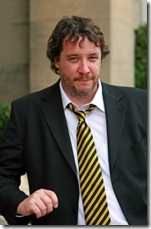 Stephen Nelson was born in Motherwell, Scotland in 1970, to the King of Belgium and his wife, a member of the Swedish Royal Family. He was educated in a monastery in Bhutan where he quickly learned the simultaneous arts of telepathy and levitation. He gave it all up for poetry, however, and now lives in a tower block somewhere in South Lanarkshire, having denounced his royal heritage and all its attendant privileges. His interests include the sun, rain, snow, grass, beaches, islands, mountains. At present he doesn’t own a bicycle, although that may change in the near future as he is intent on losing a bit of weight. He enjoys being an Anglican.
Stephen Nelson was born in Motherwell, Scotland in 1970, to the King of Belgium and his wife, a member of the Swedish Royal Family. He was educated in a monastery in Bhutan where he quickly learned the simultaneous arts of telepathy and levitation. He gave it all up for poetry, however, and now lives in a tower block somewhere in South Lanarkshire, having denounced his royal heritage and all its attendant privileges. His interests include the sun, rain, snow, grass, beaches, islands, mountains. At present he doesn’t own a bicycle, although that may change in the near future as he is intent on losing a bit of weight. He enjoys being an Anglican.
(Not sure you should take all the above seriously, folks. Someone’s tongue was definitely in their cheek when they wrote it.)
Let me leave you with a wee video of Stephen reading 'Look Up!' (part one)
REFERENCES
[1] See Harold S. Ballard, M.D, ‘The Hematological Complications of Alcoholism’, Alcohol, Health & Research World, pp. 42-52
[2] The website The Biology of Kundalini is quite helpful here.
[3] See Nicholas Saunders, ‘The spiritual aspect of rave culture’, The Guardian, 22nd July 1995
[4] Couldn’t help but think of Psalm 37:25 here, “I was young and now I am old, yet I have never seen the righteous forsaken or their children begging bread.” Presumably he’s yet to attain righteousness. Again, I’m probably being too literal.
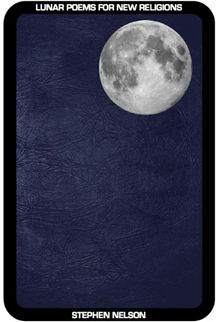

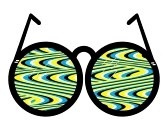


 MDMA
MDMA